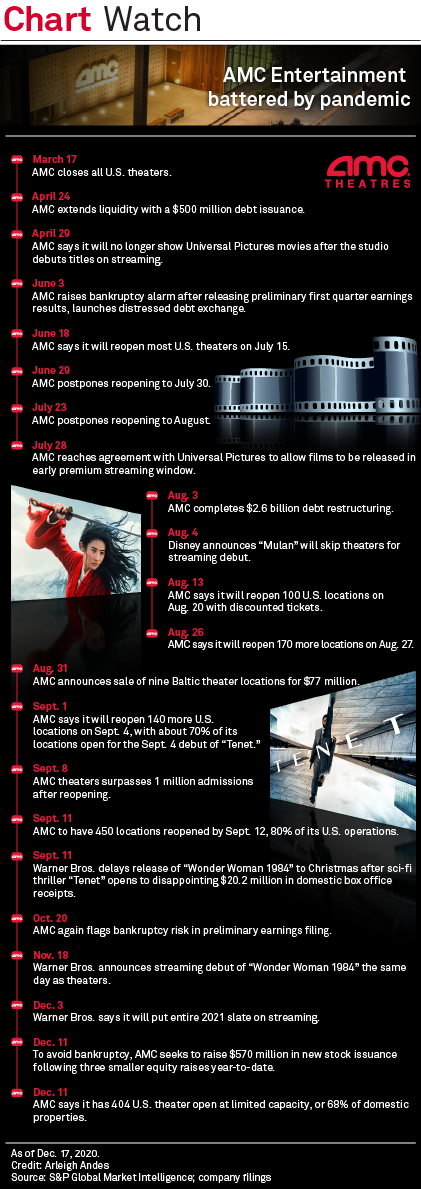After a year of turmoil, the only certainty in the theater business is that 2021 will bring further uncertainty.
While the pandemic has been a boon for some industries, like communications technology, it has totally and perhaps permanently upended the theater business. Studios have leaped at the opportunity to distribute more films on their streaming platforms, and theaters across the country are struggling to survive. Analysts believe that even after the pandemic is over, studios will continue to favor digital distribution for some film titles, and may even adjust their production strategies to accommodate new release models.
"I don't think we'll ever 100% go back to the way things were," said Wade Holden, an analyst with Kagan, a media research group within S&P Global Market Intelligence. "I think we've hit an inflection point."
Window of opportunity
The compression of the theatrical window in order to accommodate streaming debuts is perhaps the most significant change to the industry coming out of the pandemic.
Traditionally, films went to theaters with a 90-day window of exclusivity. This gave theaters guaranteed supply and it gave studios a guaranteed avenue to box office revenue. A film's success is largely a function of its opening weekend gross, with subsequent weeks dropping by predictable percentages. Even the financials of subsequent windows, like disc and streaming sales, were largely extrapolated from box office performance.
Prior to 2020, theater operators like AMC Entertainment Holdings Inc. and Cinemark Holdings Inc. ferociously guarded the 90-day window, considering it sacrosanct.
But with theaters closed this year, exhibitors lost a lot of negotiating leverage. The box office is down 93% year over year for the winter season, as of Dec. 6, according to Kagan data. Studios were forced to consider alternate methods of distribution. Through the year, The Walt Disney Co., AT&T Inc.'s Warner Bros. and Comcast Corp.'s Universal Pictures each put high-value content on streaming platforms.
The first cracks
 |
Universal led the charge in many ways, with NBCUniversal Media LLC CEO Jeff Shell saying in April that he expected to release movies simultaneously in theaters and on premium video-on-demand formats going forward. AMC threatened to boycott Universal Pictures films over the matter, but Universal did not back down.
The two eventually hammered out an agreement to give Universal Pictures the option to put films on streaming after 17 days in theaters, with a portion of profits in that streaming window going to theater operators.
The spirit of the agreement alone is a revolution in the industry, a massive change from historic failures of compromise. By comparison, AMC threatened a similar boycott of Universal Pictures in 2011 when the studio attempted an early pay-per-view window for "Tower Heist." Back then, Universal Pictures gave in to the pressure and the traditional window was retained. Back then, there was not a global pandemic.
"Mostly everything has been out of the exhibitors' control," B. Riley Securities analyst Eric Wold said in an interview. From forced closures to studio decisions for their debut films to the timing of outbreaks and vaccines, exhibitors have not had many options or much leverage to negotiate their fate.
Most recently, Warner Bros. said it would debut all 17 of its 2021 films — including potential blockbusters like "Matrix 4," "The Suicide Squad" and "Dune" — on its new HBO Max streaming platform the same day they premiere in theaters. And Disney announced a range of new series and films, some going directly to its Disney+ platform.
A new year
Wold expects exhibitors to regain some of their clout in 2021. When a vaccine is widely available, data from markets like China and Australia suggest that consumers are ready and willing to return to the cinema. And if they do, exhibitors will have cards to play again, and studios like Warner Bros. that have taken a hard and narrow approach to their release strategy may lose a lot of profit and regret their decisions.
Beyond 2021, analysts expect only smaller and midrange titles will likely get pulled from theaters in a shortened window or go straight to streaming. Major tentpole films will keep their long, lucrative box office run.
But the streaming options and strategies will likely change film distribution for the long haul, analysts say.
Different films for different platforms
Studios will be pressed to make a broader range of content, or consider their content pipeline more opportunistically when it comes to distribution, Wold said. Some films will be slated for their streaming audiences, while others will get theatrical debuts, he said. Films will not just be made and beheld to their box office debut performance, but produced and marketed for specific platforms.
So rather than putting a range of titles in theaters for three weeks to three months, studios may just choose to release two types of films: 90-day theatrical productions and straight-to-streaming productions. Disney seems to be taking that approach with its upcoming Marvel and Pixar films, according to announcements made at its recent investor day.
Such a change in the industry would narrow the model for theaters and the market for consumers, said Karie Bible, analyst with Exhibitor Relations.
"The realist says if theaters come back, it may not be the same. It may just be for giant event movies," Bible said.
However, these new models do advance a trend that has long been underway but resisted by theaters for many years.
"I knew streaming was an encroaching threat; I think we all did. But if it weren't for the pandemic I don't think we'd be having these conversations as soon as we are," Bible said.
Shawn Robbins, chief analyst at Box Office Pro, said in an interview that adapting to the new normal will take time.
"The changes here are not even just for next year," Robbins said. "This is going to be a years-long evolution."



